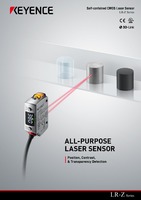
Self-contained CMOS Laser Sensor
LR-Z series
Self-contained CMOS Laser Sensor LR-Z series

New Standard!
All-Purpose Laser Photo Sensor
Position, contrast & transparency detection.
- Small body
- Mounting pitch is 25.4 mm
- U.C.D. Function

Laser sensor capable of detecting targets based on both position and contrast (detectable distance: up to 500mm).
Features
Best Detection Ability in its Class

The LR-Z's unique U.C.D. Function allows for stable detection of clear, metallic, or dark targets. This series can also detect purely based on distance, regardless of shape, colour, or surface finish.
Durable & Long Life

The IP68/69K rating means the LR-Z is ready for the roughest of factory environments. Wash-down, oil spray, and many corrosives are no match for the stainless steel body. Additionally, physical impact or even overtightening are not a concern because of the highly durable design.
Simplified Operation

Simple setup and easy operation are at the core of the LR-Z's design. With a simple 1-touch teach, calibrating this sensor is straightforward and quick. A highly visible indicator and a 7-segment display make this sensor very easy to use.
New feature U.C.D. Function Distinguishing a Target From a Background Using the Distance and Received Light
The sensor first registers the distance to the background and the received light, which are used as reference, and then detects the target by sensing that the distance or received light differs from the registered reference when a target comes into the detection area. With the background, stable detection of target is ensured even if the target is a complex shaped object, has changes in colour and surface condition, or is a thin object with a small height difference.
Without Target

With Target

-
1Difference in distance
-
2Difference in received light
Transparent Objects

Background Tuning enables the change in received light to be monitored. The LR-ZH can detect transparent objects by sensing the change in received light from the registered background. Though it is a distance setting type model, its versatility allows the detection even of transparent objects if there is a background.


